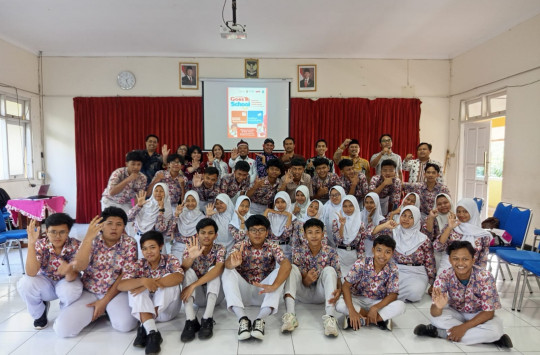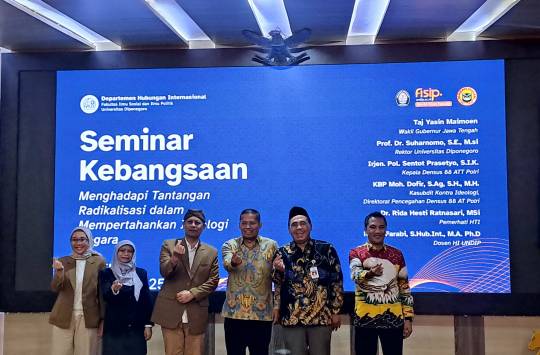
By: Noor Huda Ismail
Blood and tears stained the sands of Bali 21 years ago this October. The terror that gripped the island in the aftermath of the 2002 Bali bombings remains etched in my memory.
As a special correspondent for the Washington Post Southeast Asia bureau, I witnessed the horror first-hand. I saw blood and cried inside to see the atrocities.
The shock was compounded by the realization that some of those involved in the attack were individuals I knew personally from my childhood schooling in Central Java.
This experience propelled me into activism, sparking a personal mission to confront the complexities of terrorism in ways that transcended traditional methods. It was during this tumultuous period that I bore witness to the transformation of Detachment 88, Indonesia's elite counterterrorism unit, as it grappled with the evolving threats.
I watched with keen interest as it adapted its strategies, not just to apprehend terrorists, but to engage with them on a deeper level, exploring the ideologies that underpinned their actions.
Detachment 88's "Soft" Approaches
In the aftermath of the Bali bombings, Detachment 88 emerged as a pivotal force in Indonesia's fight against extremism. From its inception, the unit was tasked with dismantling terrorist networks through conventional law enforcement measures. However, it soon became apparent that a more nuanced approach was needed.
Detachment 88's shift towards innovative "soft" approaches, including counselling and dialogue, marked a significant turning point in its journey. It was through these unorthodox methods that the unit unearthed crucial insights from key Jemaah Islamiyah (JI) figures such as Ali Imron and Nasir Abbas, shedding light on the intricate network of extremism that had long plagued the nation.
Yet, the battle against radicalization was far from straightforward. Detachment 88 found itself entrenched in a complex ecosystem of extremist ideologies, navigating a web of influences and motivations that sustained the allure of radical beliefs.
Engaging with senior JI figures in the region presented a unique set of challenges, as their unwavering commitment to extremist ideologies tested the unit's resolve. It became increasingly clear that a standardized approach to deradicalization was insufficient.
Tailored and adaptive strategies were crucial in countering the seduction of extremist doctrines and in addressing the psychological intricacies at play.
Detachment 88's success in Indonesia reverberated beyond its borders, capturing the attention of neighbouring nations such as Malaysia, Singapore, and the Philippines.
These countries, each grappling with their security concerns, looked to Detachment 88 as a potential model for comprehensive counterterrorism efforts.
Listening to Sceptical Voices
Amid the resounding success and innovative strides of Detachment 88, a discernible undercurrent of scepticism has woven its way into the narrative. While the unit's multifaceted approach and collaborative initiatives have yielded significant results, there remain voices of dissent that question the long-term efficacy of its strategies.
Some critics argue that Detachment 88's emphasis on soft approaches and rehabilitation may be seen as a deviation from the traditional tenets of counterterrorism, potentially diluting the impact of punitive measures.
They express concerns about the feasibility of reforming individuals deeply entrenched in extremist ideologies, questioning whether such efforts can truly prevent recidivism and ensure the long-term security of the nation.
Moreover, the collaboration between Detachment 88 and the National Counterterrorism Agency (BNPT) has faced scrutiny, with some experts highlighting the challenges posed by the conflicting mandates of the two agencies.
Sceptics point to instances where the divergence in objectives has led to inefficiencies in resource allocation and jurisdictional disputes, raising doubts about the seamless coordination essential for effective counterterrorism efforts.
The Need for A Gendered and Victim-Centric Strategies
As Indonesia continues to grapple with the evolving threat of JI and the broader extremist ecosystem, the need for a gendered perspective in countering radicalization has come to the forefront.
The involvement of women in both the processes of radicalization and deradicalization has underscored the importance of inclusivity in the fight against extremism. Integrating the perspectives of survivors and families has become pivotal in shaping victim-centric counterterrorism strategies, emphasizing empathy and understanding as crucial components of the rehabilitation process.
Charles Darwin's words echo through the annals of time, a reminder of the fundamental truth that applies not only to the natural world but also to the realm of human endeavours: "It is not the strongest of the species that survives, nor the most intelligent, but the one most responsive to change."
Detachment 88's journey could stand as a living testament to the timeless wisdom embedded in this quote. Its ability to evolve, to embrace innovation, and to foster collaboration has allowed it to flourish amidst the harsh landscape of extremism. As the unit continues to navigate the treacherous waters of counterterrorism, its story serves as a beacon of hope for more secure world for generations to come.






Muahamd Ali 31 Jan 2024, 01:24 WIB
Good insight